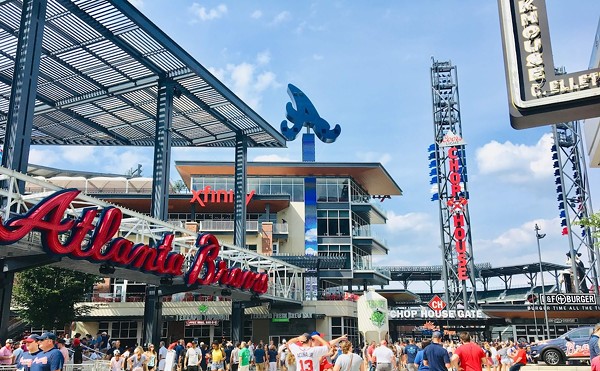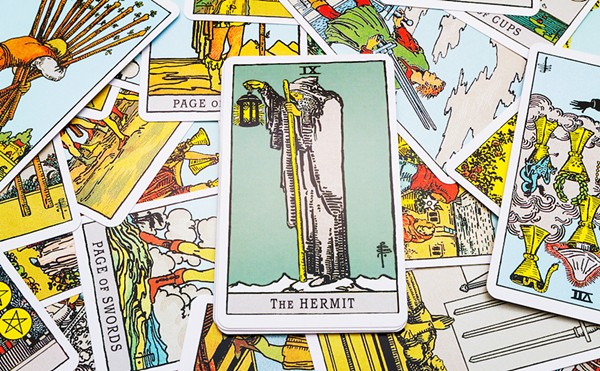Moore sees politics in no-shades-of-gray terms. He portrays himself as God's champion. Frederick Clarkson, a writer and leading expert on the Christian right, says Moore subscribes to the "doctrine of the lower magistrate," which holds that lower officials have the duty to foment revolution if government has fallen away from God.
A martyred saint to the faithful who want to stamp their religion on government, and a devilish threat to the secular, Moore is indisputably a force. And he's actually emboldened by the freefall plunge the Republican establishment is taking in opinion polls. "The Republican Party has taken on socialist airs," Moore says. "We're not a party of socialism."
Moore's platform is what you might call religious libertarianism — opposition to gay marriage, term limits for legislators and vigorous anti-taxation policies.
He's keenly aware of popular sentiments that energize his candidacy. A survey released last November by the Anti-Defamation League shows that 64 percent of Americans feel "religion is under attack." About 80 percent of those who describe themselves as evangelical or fundamentalist agree with the statement. In Alabama, Florida, Georgia, North Carolina and the rest of the South, those numbers are pumped up by the region's religious fervor.
After a day with Moore, I'm having an uncomfortable feeling. I like the guy. He's got humor and intelligence. He wears a wickedly starched white shirt and his clothes are impeccable creased — reflecting his West Point education. His intensity is palpable — but he's quick to smile. I warm up to his stories about growing up in rural Alabama, in a house with no toilet, about how he could never have afforded college except for his West Point appointment.
"The mules we plowed with were our neighbors," he recalls. "The cows we milked were our neighbors."
With deep sincerity, Moore says he has never traveled far from his roots. "I like to lay rock" for construction, he says, adding that he built his own home in rural Gallant.
Moore has compared himself to Martin Luther King Jr. — while at the same time winking at the South's neo-confederates. In 2004, Moore opposed a referendum that would have struck unenforceable segregationist language from the Alabama constitution. Voters rejected the measure by a slim 1,850 majority, a victory for Moore and a clear signal to the many unrepentant segregationists in the Heart of Dixie.
Moore sends other signs to the folks with Confederate flags on their car bumpers. One of Moore's legal advisers is John Eidsmoe, who has embraced the racist Concerned Citizens Council, a reincarnation of the "uptown Klan" White Citizens Councils of 50 years ago.
And Moore's affection for theocratic Christian Reconstruction has not-so-subtle appeal to many white Southerners. The religious movement was founded by theologian R.J. Rushdoony, who endorsed slavery and segregation because they were part of Old Testament society. In April, Moore was the headliner at a "Restore America" rally in Atlanta sponsored by a leading Christian Reconstruction organizer, Gary DeMar. Literature at the event, much of it published by DeMar, praised the antebellum South as a "God-directed" society and touted the "benefits" slavery provided blacks — primarily that it brought Africans in touch with Christianity.
"I like a lot of what he says," Moore opines about DeMar.
Moore wouldn't say what actions he'd take against gays and abortion clinics. His platform declares opposition to "pornography" and "same-sex marriage." He says a 2002 opinion he wrote in a child custody battle between two lesbians is often taken out of context to pin the hate label on him. That opinion states that homosexuality is "a crime against nature" and that the state "carries the power of the sword, that is, the power to prohibit [gay] conduct with physical penalties, such as confinement and even execution" in order to keep children from the "subversion" of the lifestyle.
In the interview, Moore says there's "no basis in the Constitution ... to strike down sodomy laws," and judges "are finding rights that do not exist." Our nation's founders "believed in penalties for sin," he says.
Even if you disagree vigorously with Moore, he puts points on the board in one category. His simple candor contrasts sharply with most politicians in this era of hyperbolic spin. Indeed, not even his fiercest foes question his sincerity.
"With George Wallace, people said he just manipulated. Racism was just politics, it wasn't in his heart," says Richard Cohen, president of the Southern Poverty Law Center, whose ultra-modern Montgomery headquarters is a 180-degree contrast, in architecture and mission, to Moore's nearby Foundation for Moral Law, housed in a historic bank building. "With Moore, what he says does reflect his heart. We've never doubted his sincerity. I don't think his zeal should be questioned. He's a giant rock in an age of turmoil."















